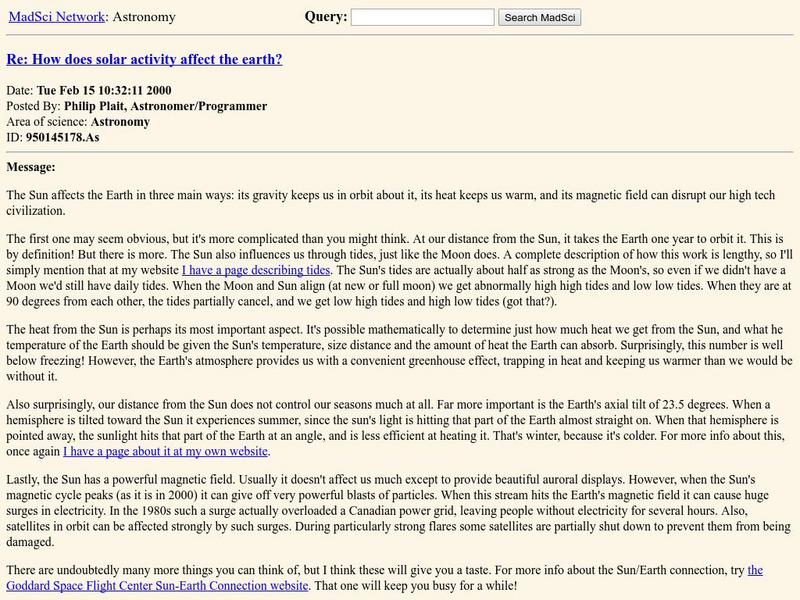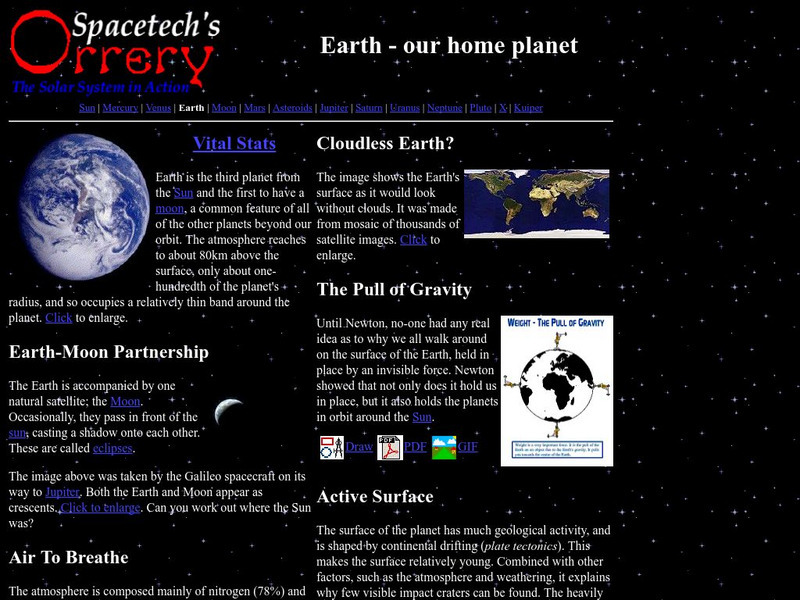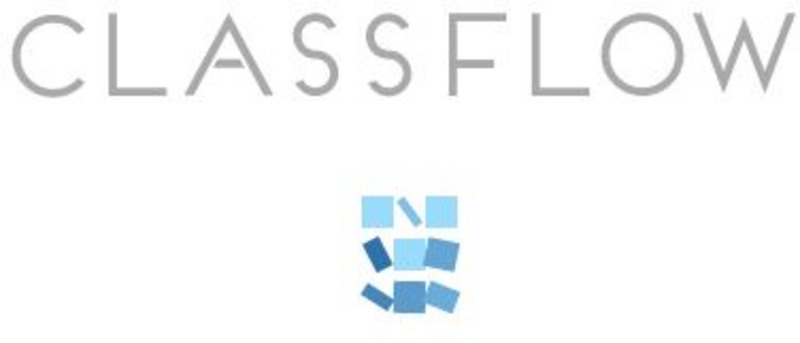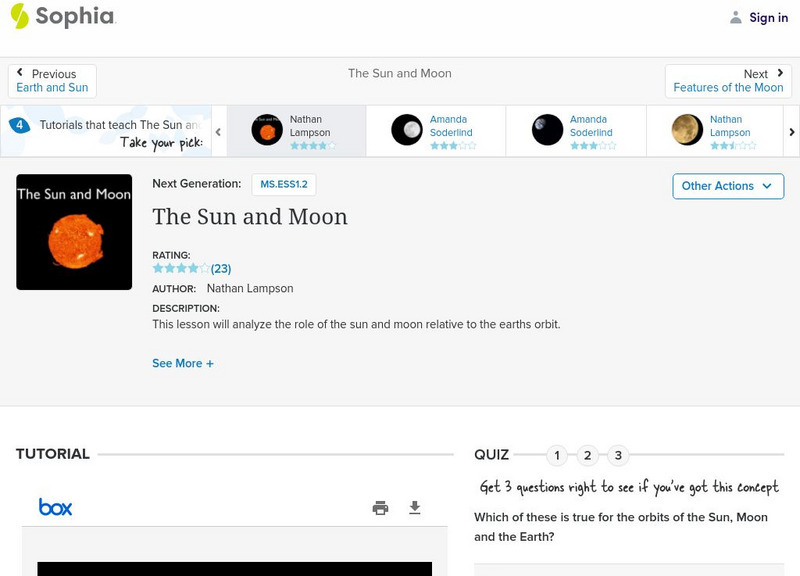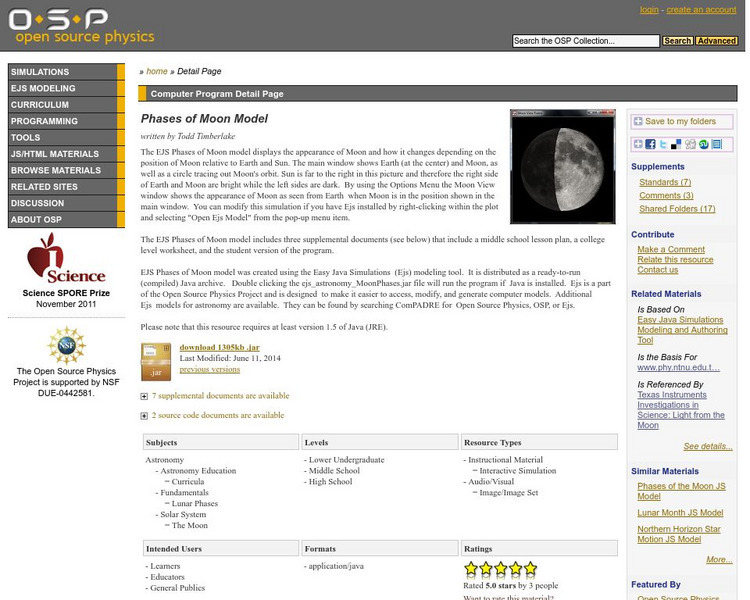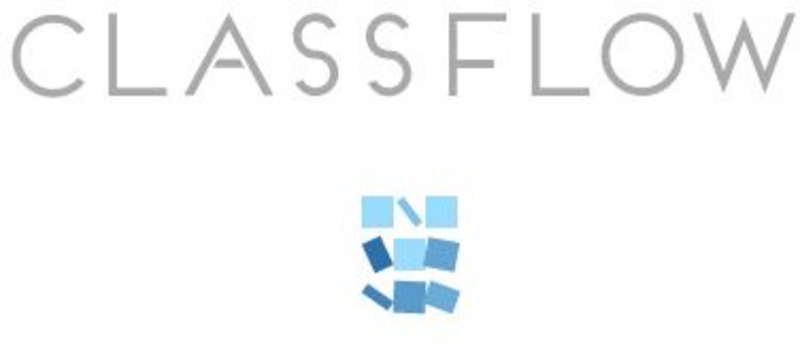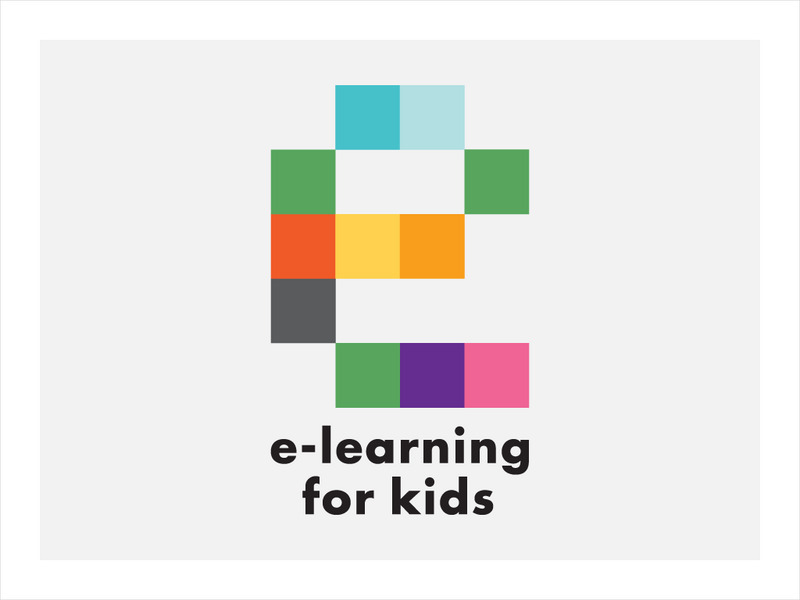Hi, what do you want to do?
MadSci Network
Mad Scientist: Why High Tide Away From the Moon or Sun?
An excellent and thorough answer to the often asked question about high tide "bulges" on the side of Earth facing away from the Moon or Sun.
BBC
Bbc Schools: Ks2 Bitesize: Science: Physical Processes: Earth, Sun, and Moon
Help Sarah Jane and her team put the solar system's planets back in order. Following the activity, read more about the sun, the Earth, and its moon, and then take a quick quiz to check for understanding.
Other
Spacetech's Orrery: Earth Our Home Planet
This site provides a very interesting overview of our home planet, Earth. Content includes a focus on the atmosphere, the pull of gravity, and the active surface.
ClassFlow
Class Flow: Phases of the Moon
[Free Registration/Login Required] This flipchart demonstrates how the positions of the Earth, Moon and Sun cause phases of the Moon. It also illustrates the positions of the Earth, Moon, and Sun during a day and a month's time.
The Wonder of Science
The Wonder of Science: Ms Ess1 1: Earth Sun Moon System
Develop and use a model of the earth-sun-moon system to describe the cyclic patterns of lunar phases, eclipses of the sun and moon, and seasons.
Utah Education Network
Uen: Earth and Moon Observations
Earth's revolution, rotation, tilt, day and night cycle, and the sun's apparent movement across the earth are explored.
Utah Education Network
Uen: Patterned Paragraphs
Students will learn about the importance of including specific details when writing. Students will watch the teacher model "How to Make a Peanut Butter Sandwich." Then student will replicate the process for writing with specificity as...
Sophia Learning
Sophia: The Sun and Moon
An expertly illustrated presentation which highlights the sun and moon, and their relationship to the Earth.
Enchanted Learning
Enchanted Learning: Zoom Astronomy: All About Space
A fantastic collection of information about the solar system. Includes information on all of the planets, the moon, the sun, asteroids, comets, meteoroids, and stars. Also find puzzles, a dictionary, quizzes, classroom activities, and...
BBC
Bb Ci Space: Earth
The BBC provides a general overview of the planet Earth. Content includes statistical information, a focus on the four seasons, moon information, and more.
American Association of Physics Teachers
Com Padre Digital Library: Open Source Physics: Phases of the Moon Model
Examine the changes that occur with the moon's movement in relationship to the Earth and Sun with this astronomy simulation.
Fourmilab Switzerland
Earth and Moon Viewer
View a map of the Earth showing the day and night regions at this moment, or from the sun, the noon, the night side, and other points of view in this simulation. Illustrated.
TED Talks
Ted: Ted Ed: A Rare, Spectacular Total Eclipse of the Sun
Andy Cohen details the extraordinary celestial phenomenon of a total solar eclipse, and when it will next occur. [3:47]
ClassFlow
Class Flow: Earth, Sun and Moon
[Free Registration/Login Required] In this unit children learn about the shapes and relative sizes of the Earth, Sun and Moon. Using models they learn how the three bodies move relative to each other and how these movements relate to...
Merriam-Webster
Merriam Webster: Dictionary Illustration: Solar Eclipse
Basic diagram of a solar eclipse illustrates the relative positions of the sun, moon, and earth.
CK-12 Foundation
Ck 12: Physics Simulation: Phases of the Moon
[Free Registration/Login Required] Learn how the steady motion of the Moon around the Earth, and the phases created by the relative position of the Earth, Sun, and Moon, allow us to tell time by simply looking at the shape and...
ArtsNow
Arts Now Learning: Phases of the Moon [Pdf]
In this lesson, 4th graders use their bodies to model the day/night cycles of the Sun and Earth. Next, they discuss the moon's role in the solar system and explore the eight phases of the moon by acting out a story. Finally, a song...
CK-12 Foundation
Ck 12: Earth Science: Tides
[Free Registration/Login may be required to access all resource tools.] Reveals tidal patterns and that tides are caused by the gravitational attraction of the Sun and Moon to Earth.
Annenberg Foundation
Annenberg Learner: Teachers' Lab: A Private Universe
This section is dedicated to educators to become expert instructors on topics like: distance between Earth, the Sun, and the moon, the phases of the moon, and reason for the seasons. Site includes information about how to address...
American Geosciences Institute
American Geosciences Institute: Astronomy
Eight hands-on lessons module in which students explore the characteristics of planet Earth, its moons, the sun, the solar system, planets, and the difference between science fact and science fiction.
Utah Education Network
Uen: The Night Sky
Learn about the rotation of the earth, the movement of the moon, and the position of the sun.
Ducksters
Ducksters: Earth Science for Kids: Ocean Tides
Did you know the rising and falling of the sea level is caused by the gravity of the Moon and the Sun? Kids learn about ocean tides including tidal currents and types of tides on this site.
E-learning for Kids
E Learning for Kids: Science: Center of the Ocean: The Sun, the Earth, and the Moon
Nita lives on Coco Island in the Indian Ocean, and is learning more about the Sun, the Earth, and the Moon. Join her and learn about day and night.
Project Britain
Primary Homework Help: Earth and Space Quiz
This resource provides information about Earth and space. In addition, there is a quiz provided.
Other popular searches
- Earth Sun and Moon
- Earth, Sun and Moon
- Sun, Earth and Moon
- Moon Earth and Sun Rotations
- Moon, Sun and Earth
- Earth, Sun, and Moon





